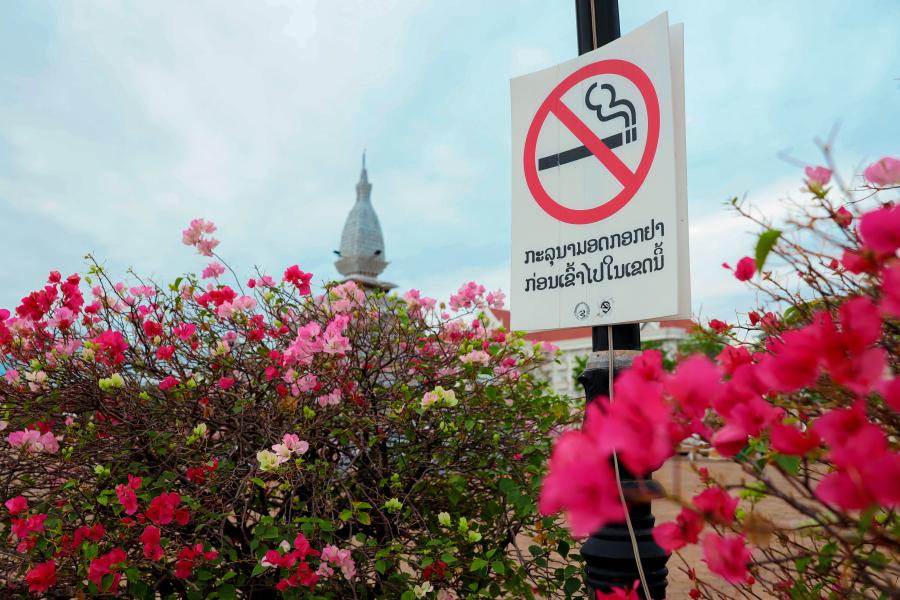Lao PDR receives dedicated UN support to strengthen tobacco control measures
03 March 2020
- 3 March 2020, Vientiane - Lao PDR has been selected as one of nine countries worldwide to receive dedicated international support from the United Nations through the second phase of the "FCTC 2030" project to accelerate implementation of the World Health Organization’s Framework Convention on Tobacco Control (WHO FCTC). The project is closely aligned to the 2030 Agenda for Sustainable Development, which includes explicit attention to tobacco control.

In welcoming the project to Lao PDR, Vice Minister of Health, His Excellency Associate Professor Dr. Phouthone Muongpak observed that, “Over 50 per cent of males and 7 per cent of females are current smokers in Lao PDR and these numbers tend to increase without intensified actions. Already more than 6,000 people die every year due to tobacco use. This project will support the Lao Government in implementing the WHO FCTC and tobacco control regulations with focus on strengthening the national tobacco control law, working towards reducing the affordability of tobacco products and protecting public policies from interference of tobacco industry.”
The WHO FCTC is the first WHO-negotiated global health treaty, with 180 countries and the European Union as Parties to the treaty. It was adopted by the WHO Assembly on 21 May 2003 and entered into force on 27 February 2005. The FCTC is committed to eradicating the global epidemic of tobacco use and is a comprehensive blueprint for governments to reduce tobacco use and its proven harmful effects.
Tobacco use harms our health and often leads to life-threatening and debilitating diseases including cancer, heart and lung diseases. It is one of the world’s leading causes of early and preventable death.
Tobacco use is also a critical development issue. It is a leading contributor to many social, economic and environmental challenges, which impede national development efforts. These include reduced economic growth and productivity due to less healthy workforces, impoverished families burdened by high medical costs, the loss or reduced contributions of households’ primary earners due to tobacco-related illnesses, and irreversible ecological/environmental damage linked to intensive, industrial tobacco cultivation. Tobacco control measures will not only improve life expectancy in Lao PDR but will also reduce pressure on the country’s health system, helping families avoid large and unavoidable health expenditures.
Tobacco control efforts in Lao PDR have a solid foundation to build upon. The ratification of the WHO FCTC in 2006, led to the Government of Lao PDR’s successful introduction of large, vivid health warnings covering 75 per cent of the principal display areas of tobacco products. In addition, a comprehensive ban on smoking in indoor public areas and work premises to reduce public exposure to harmful tobacco smoke, was implemented.
“Tobacco disproportionately harms poor and vulnerable communities, widening social inequalities and impeding sustainable development. The multisectoral development impacts of tobacco require a ‘whole-of-government’ and ‘whole-of-society’ approach to be successful”, added the UN Resident Coordinator in Lao PDR, Ms. Sara Sekkenes.
The FCTC 2030 project serves as a catalyst for initial country action to achieve the 2030 Agenda’s targets on health and sustainable development. It will run until the end of March 2021 and will channel international support to Lao PDR through the United Nations, including the Secretariat of the WHO FCTC, United Nations Development Programme (UNDP) and WHO. The support includes expert advice, technical assistance and peer support to strengthen Lao PDR’s programme of work on tobacco control. The Governments of the United Kingdom, Norway and Australia have generously contributed funds for the FCTC 2030 project.
Visiting Lao PDR this week from the Secretariat of the WHO FCTC, Mr. Rodrigo Santos Feijo stated that “All governments that have ratified the WHO FCTC have committed to implementing comprehensive tobacco control policies in the interest of public health. Through the FCTC 2030 project, Lao PDR will receive dedicated support to strengthen public health by protecting people from the harms of tobacco”.



